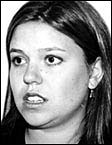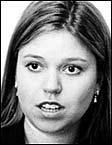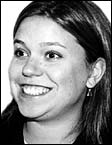|
The Interview, a regular feature of The Catholic New World, is
an in-depth conversation with a person whose words, actions or
ideas affect today’s Catholic. It may be affirming of faith or
confrontational. But it will always be stimulating.
Young missionary learns
about poverty, life
This week, Catholic New World staff writer Michelle Martin talks
with Maggie Daly, who returned in July from spending a year on
mission in Ecuador.
Meet the new face of the missionary movement. Not a priest or
a nun, but a young person who took time off during her education
to help others in a place that many people would never think about
visiting.
Maggie Daly, 22, spent a year at the Working Boys’ Center in Quito,
Ecuador. Daly, the oldest of four children, lives with her family
in River Forest and graduated from St. Norbert College in DePere,
Wis., in 1999 with a degree in political science. Now she is looking
for a job to earn money before going to graduate school for a
master’s degree in education.
She found out about the Working Boys’ Center through sheer chance—a
friend from college was the son of the U.S. volunteer coordinator,
and the nephew of one of two Sisters of Charity of the Blessed
Virgin Mary who administer the center with its founder, Jesuit
Father John Halligan.
Catholic New World: Why did you decide to go to the Working Boys’
Home?
Maggie Daly: I was first introduced to the mission on a part-time basis in
1996, when I spent two or three weeks there. I just loved it.
They just had their 35th anniversary in December 1999. I couldn’t
believe how this mission had grown from 11 working boys in the
attic of a Jesuit church to over 400 families, with three meals
a day.
CNW: Tell me about the center.
MD: The mission statement is, “A family of families.”
Families have to make a commitment to the center, which would
be that all of their kids will show up for school every day, that
they will all take a bath at our center every day—all of the adults
too—we were real strict about that. It’s tough love. We offer
them three meals every day, but they don’t have to take them.
If they’re going to come, they have to be on time. It’s a real
tight ship, and some people don’t make it. It’s kind of sad.
We have a lot of different programs. We have medical care on staff.
The kids have been working shining shoes since the first grade.
After the kids graduate from the sixth grade, they go to high
school. It’s a technical high school for the boys and the girls,
and they all work a lot in high school. We have four businesses:
a furniture shop, a bakery and restaurant, a hair salon and an
auto mechanic shop. It’s a great way to help these kids get trade
skills. Unfortunately, studying art history and politics won’t
help them at all.
CNW: What did you do there?
MD: I taught in the grade school, mainly. I taught art, I taught special
education and adult education, which involved things like healthful
living skills, geography and math and literacy on a very, very
basic level. I also taught in the girls’ program, which is basically
a socialization program for the girls that we do when the boys
are out working. The boys all go out and shine shoes either three
mornings a week or three afternoons a week. I taught English in
that program, starting in the first grade.
CNW: Do they have a corps of volunteers like you every year?
MD: Yes. It varies. The commitment can be either one year or two years.
Last year, we had 20 volunteers. This year they only expect 10.
It’s hard for people to get the money together. I was very lucky
that I had a parish that could support me.
CNW: What did you take a way from the experience?
MD: I definitely am having a harder time readjusting to life in the
States than I did initially going down there. Since I had been
there before, I was over the shock of not having running water
and people being so poverty-stricken. You get really desensitized
really quick down there. I had fleas and all that other stuff,
and it just doesn’t even faze you after about a month.
Since I came back here, I’ve just been shocked at the materialism
of the First World. People just take for granted the luxury of
their justice and their rights. It’s been hard for me to immerse
myself back in the system and accept that I’m going to be throwing
food away again, and I’m going to be taking my liberties and rights
for granted. I have the opportunity to make money and do well.
That’s really difficult for me right now, because I’m kind of
caught between both worlds.
CNW: Is this something that you would recommend to other people?
MD: Definitely. Without a doubt. It is a lot of work. Maybe not everybody
could handle this for a year, being away from your life at home
and working 12 hours a day for a mission that you’re not getting
paid for. It’s really challenging, but I would recommend it to
anyone who was interested in this kind of service.
Donations to the Working Boys’ Center can be sent to volunteer
coordinator and director of fund raising Patricia Parks, 12750
Stephen Place, Elm Grove, WI 53122. Checks should be made payable
to Family Unity International. For more information, call Parks
at (262) 797-8988.
Front Page | Digest | Cardinal | Interview
Classifieds | About Us | Write Us | Subscribe | Advertise
Archive | Catholic Sites | New World Publications | Católico | Directory | Site Map
|









